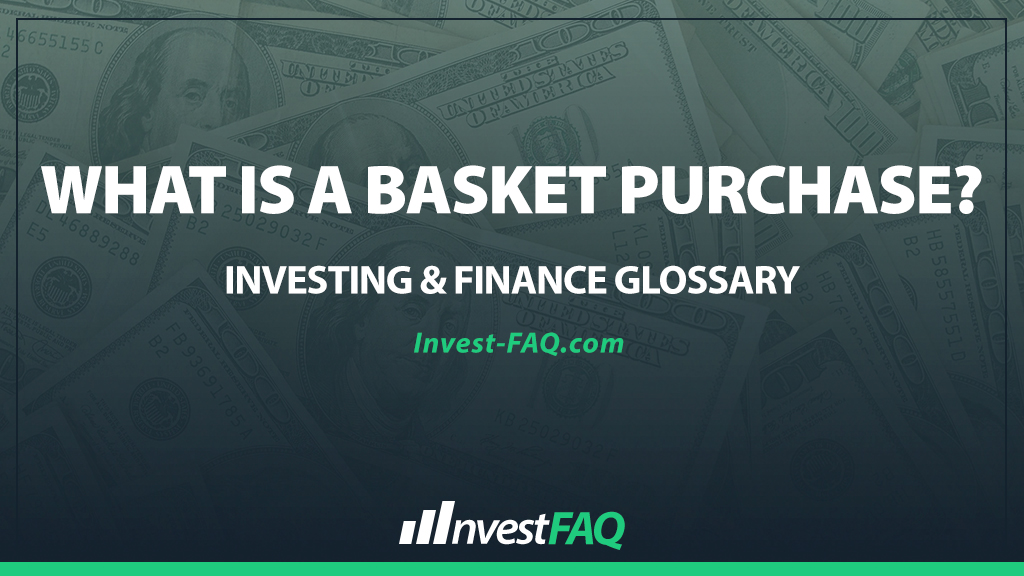
Basket Purchase
Contents
A basket purchase, also known as a lump-sum purchase, refers to the acquisition of a group of assets for a single, combined price without specifying the cost of each individual asset within the group.
This accounting concept is frequently encountered when a company buys multiple assets together, such as a bundle of equipment or a combination of land and buildings, and needs to allocate the total purchase price among the individual assets based on their fair market values.
In business, basket purchases are common during mergers and acquisitions, real estate transactions, and when acquiring multiple pieces of equipment or assets simultaneously.
The primary challenge in these transactions is determining the fair value of each asset within the basket for proper accounting treatment, depreciation, and tax purposes.
Accurately allocating the total cost among the assets is essential for financial reporting, compliance with accounting standards, and strategic financial planning.
Example of a Basket Purchase
Suppose “Gourmet Foods Inc.” acquires a property that includes a building, land, and equipment for a total of $1 million. An appraisal values the building at $700,000, the land at $200,000, and the equipment at $100,000. To allocate the purchase price, Gourmet Foods Inc. must determine the percentage of the total value represented by each asset:
- Building: 70% ($700,000 / $1,000,000)
- Land: 20% ($200,000 / $1,000,000)
- Equipment: 10% ($100,000 / $1,000,000)
Accordingly, the purchase price is allocated as follows:
- Building: $700,000
- Land: $200,000
- Equipment: $100,000
In this scenario, Gourmet Foods Inc. uses the fair market values to distribute the total purchase price among the different assets acquired in the basket purchase.
This allocation is crucial for subsequent accounting processes, such as calculating depreciation for the building and equipment (since land is not depreciated) and accurately reporting the company’s assets on its balance sheet.
This method ensures that financial statements reflect the real economic value of each asset, providing stakeholders with a transparent view of the company’s financial health.
Significance for Investing & Finance
The concept of a basket purchase holds significant importance in accounting for several reasons:
Accurate Asset Valuation: Proper allocation of the total purchase price to individual assets ensures that a company’s financial records accurately reflect the value of its assets, essential for both internal decision-making and external reporting.
Compliance and Reporting: Adhering to accounting standards, such as GAAP or IFRS, requires that companies accurately report the cost and value of assets acquired in a basket purchase, impacting depreciation calculations and tax implications.
Strategic Financial Management: Understanding the individual and collective value of assets acquired in a basket purchase aids in strategic planning, investment analysis, and the management of a company’s asset portfolio.
In summary, a basket purchase involves the strategic allocation of a lump-sum payment across multiple assets, requiring careful consideration to ensure compliance with accounting standards and accurate financial reporting.
This concept is crucial in providing clarity and precision in the valuation and accounting treatment of assets, thereby supporting effective financial management and strategic decision-making within a business.
FAQ
How is the purchase price allocated among assets in a basket purchase?
In a basket purchase, the total purchase price is allocated among the acquired assets based on their individual fair market values at the time of acquisition, ensuring that each asset’s value is accurately reflected in the company’s financial statements.
What challenges do companies face when accounting for a basket purchase?
Companies may encounter challenges in determining the fair market values of individual assets within a basket purchase, requiring appraisals or valuations that can be complex and time-consuming to ensure accurate allocation of the purchase price.
Can the allocation of purchase price in a basket purchase affect future financial statements?
Yes, the allocation of the purchase price in a basket purchase affects future financial statements, particularly through depreciation and amortization of the allocated values of tangible and intangible assets, influencing future expenses and asset valuations.
Why is accurate allocation of a basket purchase important for tax purposes?
Accurate allocation of a basket purchase is crucial for tax purposes because it determines the basis for depreciation or amortization deductions, affecting the taxable income and tax liabilities of the business in subsequent years.
